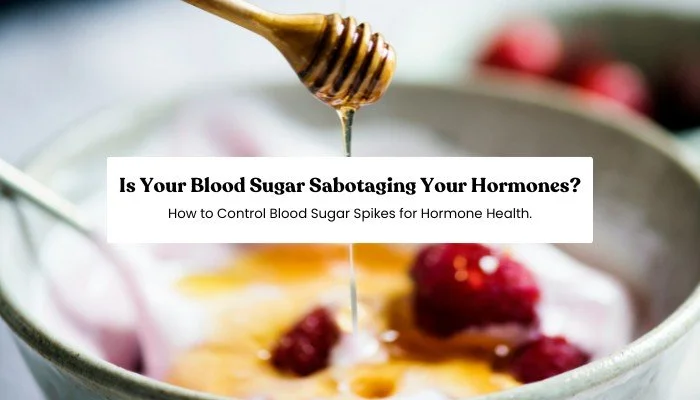Is Your Blood Sugar Sabotaging Your Hormones?
How to Control Blood Sugar Spikes for Hormone Health.
If you’ve ever felt like your hormones are running the show—dictating your mood, energy levels, or even your skin—you’re not imagining it. Hormones are the body’s messengers, orchestrating everything from your metabolism to your sleep. But what you might not realize is how closely your hormones are tied to something seemingly simple: your blood sugar.
Blood sugar balance isn’t just about preventing diabetes or managing weight. It’s a foundation for how your entire hormonal system functions. When it’s out of balance, it can quietly wreak havoc, showing up as fatigue, cravings, irritability, or even hormonal conditions like PCOS, thyroid dysfunction, or irregular cycles.
Let’s explore why blood sugar matters so much for your hormonal health—and, more importantly, how to bring it back into balance in a way that feels doable and sustainable.
The Blood Sugar - Hormone Connection
Every time you eat, your blood sugar rises. This is completely normal—it’s how your body converts food into energy. But when your blood sugar spikes too high or drops too low, your body goes into survival mode, triggering hormonal responses.
Insulin, the hormone that helps move sugar from your bloodstream into your cells to be used for energy, is the first responder. If your blood sugar is consistently high, your body produces more and more insulin to keep up, which can lead to insulin resistance—a condition where your cells stop responding to insulin properly.
Here’s where it gets tricky: insulin resistance doesn’t just affect blood sugar. It also disrupts other hormones like estrogen, testosterone, and cortisol, creating a ripple effect throughout your body.
This is why unbalanced blood sugar is often at the root of hormonal imbalances.
When your blood sugar swings wildly—spiking after a sugary snack or crashing after skipping a meal—it puts stress on your adrenal glands, which produce cortisol. Elevated cortisol can throw off your reproductive hormones, leading to irregular cycles, mood swings, or even difficulty conceiving.
=> In short, balanced blood sugar isn’t just about energy—it’s about giving your entire hormonal system a steady foundation.
The Symptoms of Imbalanced Blood Sugar
Sometimes, blood sugar imbalances are subtle. You might not connect the dots between how you feel and what you’ve been eating.
But here are some common signs to watch for:
You feel shaky, lightheaded, or irritable if you go too long without eating.
You experience intense sugar cravings, especially in the afternoon or evening.
Your energy crashes after meals, leaving you feeling sluggish.
You find it hard to lose weight, especially around your midsection.
Your mood feels like a rollercoaster—calm one moment, irritable the next.
These symptoms are your body’s way of saying it’s struggling to keep your blood sugar steady.
How to Balance Blood Sugar for Hormonal Health
The good news is you don’t need to follow a complicated diet or cut out all your favorite foods to balance your blood sugar. Small, consistent changes can make a world of difference.
Start by focusing on your meals. A balanced plate includes three key components: protein, healthy fats, and fiber-rich carbohydrates. These work together to slow down digestion, keeping your blood sugar stable instead of spiking and crashing.
BREAKFAST
For breakfast, think beyond cereal or pastries, which are often heavy on refined carbs. Instead, try:
Scrambled eggs with avocado and a side of sautéed spinach
Greek yogurt topped with chia seeds and berries.
These meals provide steady energy through protein plus healthy fats to carry you through your morning.
SNACKS
Snacking strategically can also help. If you reach for a sugary granola bar or a bag of chips when your energy dips, you’re setting yourself up for another crash. Instead, pair a source of protein or fat with a whole food carb. This combination keeps your blood sugar even and your energy steady. Try these balanced snacks:
A handful of almonds + an appler
A slice of cheese + carrot sticks
EAT AT REGULAR INTERVALS
Another powerful tool is eating regularly. Long gaps between meals can cause your blood sugar to dip too low, prompting your body to release cortisol to bring it back up. This can leave you feeling tired, stressed, and out of balance. Aim to eat a small amount every 3-4 hours to prevent these crashes.
The Role of Lifestyle in Blood Sugar Balance
It’s not just about food. Sleep, movement, and managing stress all play a role in keeping your blood sugar—and your hormones—steady.
When you’re sleep-deprived, your body is less sensitive to insulin, making it harder to keep your blood sugar in check. Prioritizing quality sleep—7-9 hours a night—gives your body the reset it needs.
Movement, even gentle exercise like walking, helps your muscles use glucose for energy, lowering your blood sugar naturally. A short walk after meals can be especially effective.
And then there’s stress. Chronic stress elevates cortisol, which not only disrupts blood sugar but also throws off other hormones like progesterone and estrogen. Incorporating stress-reducing practices, whether it’s deep breathing, yoga, or simply spending time outside, can make a huge difference.
When your blood sugar is steady, your body can focus on what it’s meant to do: produce and regulate hormones in harmony, keep your energy steady, and support your overall well-being.
Because when your blood sugar is in balance, your hormones follow suit, and everything—from your energy to your mood to your long-term health—feels a little more aligned. And that’s a kind of balance worth striving for.
If your body has felt off - your energy, cycles, sleep, mood - and you haven’t found an approach that makes sense or works long-term, The Hormone Reset program was made for you. Join us. ⬇️


